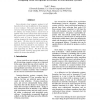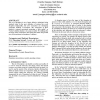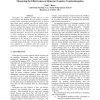325 search results - page 1 / 65 » Designing Good Deceptions in Defense of Information Systems |
ACSAC
2004
IEEE
13 years 8 months ago
2004
IEEE
Since attackers trust computer systems to tell them the truth, it may be effective for those systems to lie or mislead. This could waste the attacker's resources while permit...
NSPW
2006
ACM
13 years 10 months ago
2006
ACM
The use of deception is one of many defensive techniques being explored today. In the past, defenders of systems have used deception haphazardly, but now researchers are developin...
HICSS
2005
IEEE
13 years 10 months ago
2005
IEEE
Achieving information assurance and security is a complex and challenging task, which is crucial from national and personal security point of views. Research in detecting deceptiv...
HICSS
2006
IEEE
13 years 10 months ago
2006
IEEE
Honeypots are computer systems that try to fool cyberattackers into thinking they are ordinary computer systems, when in fact they are designed solely to collect data about attack...
IRI
2006
IEEE
13 years 10 months ago
2006
IEEE
Safeguarding practices for networked systems involves decisions in at least three areas: identification of welldefined security policies, selection of cost-effective defense strat...



